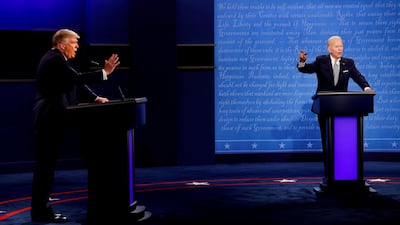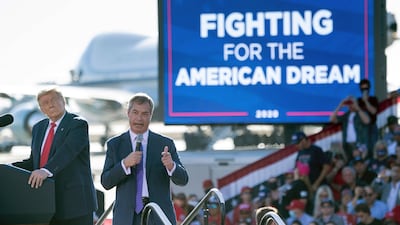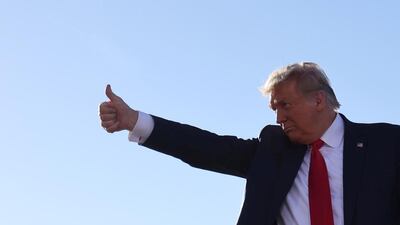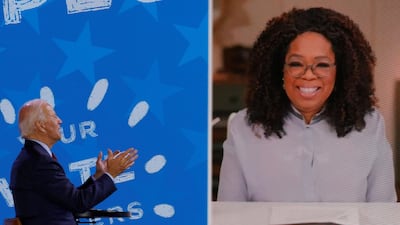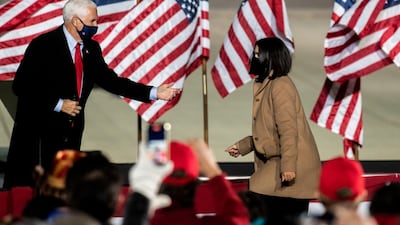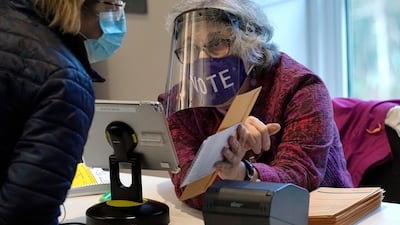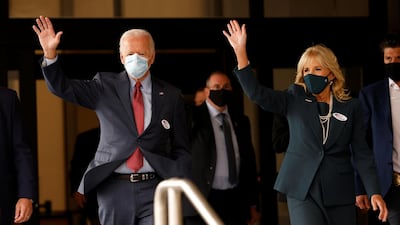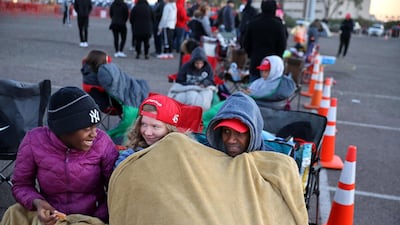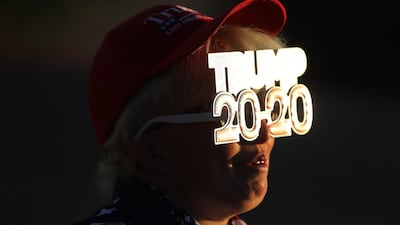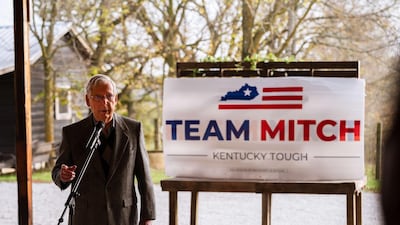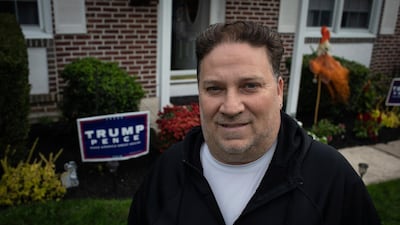Back in 2008, when a young senator from Illinois became the 44th president of the United States, I was so proud to be American that I hung a photocopied image of Barack Obama superimposed with the word "Hope" on the door of my Paris flat.
It was such an un-French thing to do; but even my bourgeois neighbours in the 6th arrondissement grinned when they saw it. Some congratulated me as though I had personally got Mr Obama elected. One even sent me a note: “High five. When you guys do it, you really do it right.”
That was a dozen years ago, a golden time when the White House had a cool, highly intelligent African-American man at the helm. For the first time in my many years of living abroad, I did not hide the fact I was born in the US. Mr Obama single-handedly rebranded America after the horror of the Iraq war.
Since then, my country has been assaulted at a level I never could have forecast. Every pillar of democracy is threatened to crack in two: human rights, rule of law, freedom of the press, the justice system. All are endangered.
Egged on by Donald Trump's approach and his terrifying fan base composed of right-wing militias such as the Proud Boys and conspiracy theorists such as QAnon, we've succumbed to a nastiness that is unprecedented. It has made the tribalism between Americans even more apparent; it makes me fear we could head down a road to potential civil war.
Watching President Trump's now infamous 60 Minutes interview last week, when he stormed off the set leaving veteran reporter Lesley Stahl aghast, I wondered when we let this campaign get so dirty. Shouldn't there have been a referee?
Both sides are guilty, but one side more so. The 2020 election makes Mr Trump's 2016 bellicose attacks on Hillary Clinton – the "Lock her up!" and "She's such a nasty woman" taunts – look tame.
The 2020 election has had no holds barred. Mr Trump told Ms Stahl that he was a victim of fake news; that he was bullied; that “Sleepy Joe” never had to answer tough questions; that "Potus" was shown no respect; that he was beleaguered and attacked.
What has been revealed this election season is Mr Trump’s lack of empathy, his mockery of those who are weaker: stutterers, “losers”, the poor, the disenfranchised, those who are not strong enough to become real estate sharks or marry supermodels.
Hunter Biden – an allegedly seedy character but one who deserves compassion for battling addiction, and losing his mother and sister in a childhood car crash – has been used as a centre-piece of Mr Trump's venom. Biden senior has a history of making gaffes – so he's been attacked as intellectually incompetent. The New York Times called the debates so cruel that they were "trampling decorum".
One Massachusetts voter told me she still has “PTSD” from the shock of the 2016 elections. She says she will refuse to watch the election returns this year, because they are too cruel. Instead, she will “take something strong and go to bed early”.
In 2016, a glowing Michelle Obama told the Democratic National Convention: “When they go low, we go high.” It’s been a battle cry for the bullied, the underclass, those who are subjugated. But the Democrats weren’t much better than Mr Trump this time around.
Mr Biden would not have been my choice for president – I backed Elizabeth Warren – but he is, above all, a decent man. He's suffered losses that no one should be expected to shoulder and, despite that, appears not to be broken by life. But even Mr Biden – a veteran Washington politician – seemed stunned by the vehemence of Mr Trump's malicious barbs.
"They are vicious," Mr Trump said of the "Dirty Democrats". He called Mr Biden "senile" and said House of Representatives Speaker Nancy Pelosi "sounds drunk". Meanwhile, the Lincoln Project, a group of disgruntled Republicans with a brilliant social media strategy, have cruelly gone after Mr Trump to a point where even I – who can't wait to see the end of the Trump presidency – think that he is himself being bullied. The balloons of him wearing a diaper and floating above cities were low blows. The schadenfreude when he tested positive for Covid-19 was mean-spirited. The posters of daughter Ivanka Trump and son-in-law Jared Kushner in Times Square looking like idiots are a step too far.
At what point did we stoop so low? When did elections become 7th grade and full of adolescent angst and pimply aggression? So I started looking back at American history and nasty moments. I found plenty that I was not taught in history class.
In 1800, for instance, former friends and co-draftees of the Declaration of Independence John Adams and Thomas Jefferson went head to head in a most politically incorrect way. The founding fathers were decidedly not moral and decent. Jefferson called Adams “a hideous hermaphroditical character”, neither man nor woman. Adams then predicted a Jeffersonian win would be akin to Armageddon with “female chastity violated… children on pikes”. Jefferson beat the hermaphrodite; the former friends never spoke again.
In 1828, the European-educated statesman John Quincy Adams got personal. He called opponent Andrew Jackson’s mother a common prostitute “who married a mulatto man”. Herbert Hoover was more ridiculous. He smeared Al Smith in 1928, at the height of the Jazz Age, for being Catholic, and a “card-playing, cocktail-drinking [fan of] prize-fighting, divorces, novels, poodles.” In 1964, the notoriously uncouth Texan Lyndon Baines Johnson destroyed the Barry Goldwater campaign by stealing speeches and made an ad of Goldwater blowing up a little girl with an atom bomb.
But nothing came close to Richard Nixon’s renown for cold cruelty. He told his supporters to call New Hampshire voters in the middle of the night whispering that black people would be bussed in for work if they voted for his rival Edmund Muskie. Nixon stole stationery from Muskie and forged the famous “Canuck letter” showing prejudice against Americans of French-Canadian descent. The Canuck letter made Muskie publicly break down in tears.
It got even lower. Nixon also released mice at a news conference with tags on them, calling Muskie "a rat fink". We all know what happened next: Nixon won but karma and the Watergate scandal brought him down.
Mercifully, we are now close to the end of the race. Most Americans are worn out by the pandemic and the economy. The election has been an additional psychological strain. I truly believe the entire American population is suffering from moral injury from the events we have seen over the past six months.
Will we be celebrating a pandemic Thanksgiving – one of the most important American holidays – with a new man heading for the White House? Given 2016’s trauma, I am not going to make a call on who will win. I have already voted; I will wait it out.
But either way, whoever gets it, they should issue a formal apology to the American people for forcing us to endure a long, bitter and deeply unpleasant campaign: one that revealed how low people will go to cling to power.
Janine di Giovanni is a Senior Fellow at Yale University’s Jackson Institute for Global Affairs
